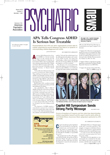Congress should pass parity legislation because the benefits far outweigh the minimal costs, said lawmakers and others who spoke at a symposium organized by APA and the National Alliance for the Mentally Ill (NAMI) on Capitol Hill last month.
The annual event was the 17th symposium held in October during Mental Illness Awareness Week. The goal is to educate lawmakers and their aides about the latest developments in research and treatment of mental illnesses.
APA Medical Director–Designate James Scully, M.D., said at the symposium, “The struggle in Congress to eliminate arbitrary insurance discrimination against patients seeking treatment for mental illness occurs . . .at a point in time when the diagnostic science and treatment options have never been more robust.
“We believe that the opposition to a national parity law is fostered by the insurance industry and abusive managed care practices, with their clear incentives to offer discriminatory and limited coverage for those with mental illness.”
He explained what parity legislation would and wouldn’t do. Both the House Mental Health Equitable Treatment Act (HR 4066) and the companion bill in the Senate (S 543) would leave medical-necessity determinations up to the health plan and give employers and insurance companies wide latitude in benefit design and management of services delivered.
“These and similar bills are not mandates but should be properly viewed as coverage conditions,” said Scully.
He also addressed the argument by opponents that parity for all mental disorders codified in DSM-IV is too broad. “NIH’s and NIMH’s research applications, FDA treatment indications for new products, and legal determinations of competence to stand trial are all predicated on widely accepted DSM criteria,” said Scully.
“The struggle over parity is the story of triumph of science over stigma and ignorance. This discrimination must stop,” he emphasized.
Sen. Paul Wellstone (D-Minn.), co-sponsor with Sen. Pete Domenici (R-N.M.) of the Senate-passed parity bill, emphatically agreed. Wellstone called on President George W. Bush to live up to his promise of working with Congress to see that parity gets passed this year.
The House parity bill has languished due to opposition by key Republicans.
Rep. Rush Holt (D-N.J.), whose son is a psychiatrist and wife is an internist, said, “It doesn’t make sense to train upcoming physicians to treat the whole person, as my wife does, and not have health care coverage for one in five people with mental disorders.”
Holt and his colleagues in the House, including Reps. Gary Miller (R-Calif.), Connie Morella (R-Md.), and Howard Coble (R-N.C.), praised APA and NAMI for their efforts to push parity forward and vowed to continue to fight for parity legislation on Capitol Hill.
APA President Paul Appelbaum, M.D., also took the opportunity to praise the editorial board of the Washington Post for its advocacy of parity in a September 9 editorial (Psychiatric News, October 4). “The arguments about cost, poor timing, and parity being too broad didn’t hold water.”
Appelbaum presented a Special Commendation award to Rep. Marge Roukema (R-N.J.) (see
box on page 6) for her “extraordinary leadership and tireless personal dedication to improving the lives of people with mental illness.”
Herbert Pardes, M.D., president and CEO of New York Presbyterian Hospital and symposium moderator, described the revolution in research and treatment of mental illness. “When people ask me what the federal government, in particular the National Institute of Mental Health, does for us, I tell them that research funding transforms people’s lives, gives us ways to overcome mental illness, and returns patients to full functioning,” said Pardes, a former director of NIMH and a past president of APA.
Richard Nakamura, Ph.D., NIMH acting director, said the World Health Organization reported last year that the burden of mental illness is a leading cause of disability worldwide.
He presented slides of brain images taken of the hippocampus region to illustrate its reduced size in a person with depression compared with that in a person without depression. Nakamura also showed brain images of adolescents with schizophrenia and those without the disorder that vividly illustrated the extensive loss of neurons associated with the disorder.
Suzanne Vogel-Scibilia, M.D., a NAMI board member and a clinical psychiatrist in Beaver County, Pa., described her journey with bipolar illness, which began in adolescence. “Without adequate mental health coverage, I couldn’t afford inpatient treatment and often had to choose between buying food or medication.”
She called on members of Congress to pass parity legislation to ease the financial burden on patients and their families. ▪






